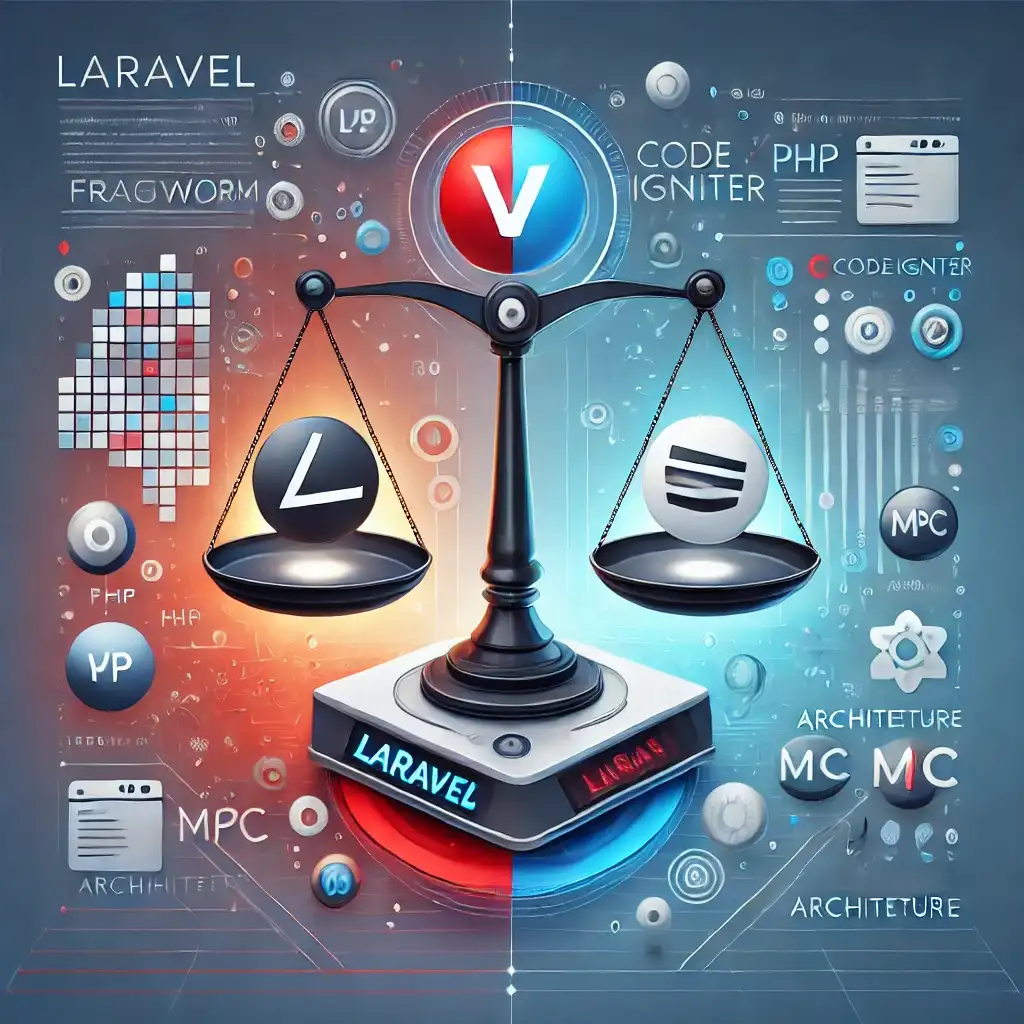
When developing PHP-based web applications, two of the most popular frameworks are Laravel and CodeIgniter. Choosing between these two frameworks can sometimes be challenging. While Laravel stands out with its modern features and extensive ecosystem, CodeIgniter is known for being lightweight and fast.
In this article, I will compare Laravel and CodeIgniter and examine which framework is better suited for which scenarios. Feel free to leave your comments if you disagree with any points.
NOTE: This article was written upon special request.1. General Comparison
Let’s compare Laravel and CodeIgniter based on their core features:| Feature | Laravel | CodeIgniter |
|---|---|---|
| Release Year | 2011 | 2006 |
| MVC Support | ✅ Yes | ✅ Yes |
| ORM Support | ✅ Eloquent ORM | ❌ None (Query Builder available) |
| Built-in Security | ✅ CSRF, XSS protection | ⚠️ Limited security measures |
| Performance | 🔵 Medium (Consumes more resources) | 🟢 Fast and lightweight |
| Database Support | ✅ Very broad (MySQL, PostgreSQL, SQLite, SQL Server) | ✅ MySQL, PostgreSQL, SQLite |
| Learning Curve | ⚠️ Medium/Hard (More structure and topics to learn) | 🟢 Easy (Simple and lightweight structure) |
| CLI Tool | ✅ Artisan | ❌ None |
| RESTful API Support | ✅ Yes (Easy integration) | ⚠️ Requires more manual configuration |
2. MVC Structure and ORM Usage
Both Laravel and CodeIgniter support the Model-View-Controller (MVC) structure. However, Laravel features Eloquent ORM, while CodeIgniter only has a Query Builder.Laravel: Eloquent ORM Usage
Laravel’s Eloquent ORM simplifies database operations:
PHP
$users = User::where('status', 'active')->get();
- ✅ Advantage: Provides more readable and easier code.
CodeIgniter: Query Builder Usage
CodeIgniter uses Query Builder instead of ORM:
PHP
$this->db->where('status', 'active');
$query = $this->db->get('users');
$users = $query->result();
- ✅ Advantage: Uses less memory, but the syntax is longer.
3. Performance and Speed Comparison
| Criteria | Laravel | CodeIgniter |
|---|---|---|
| Speed | ⚠️ Slower (uses more structure) | 🟢 Faster (lightweight framework) |
| Resource Usage | 🔵 Consumes more memory | 🟢 Uses fewer system resources |
| Caching | ✅ Yes (Redis, Memcached support) | ✅ Yes (But more limited) |
- 📌 Conclusion: If performance and speed are your priority, CodeIgniter is more advantageous. However, in large-scale projects, Laravel’s additional tools might save time.
4. Security and Developer-Friendly Tools
Security is a critical factor for modern web applications.Laravel Security Features:
- ✅ CSRF protection (Cross-Site Request Forgery)
- ✅ XSS protection (Cross-Site Scripting)
- ✅ Automatic SQL Injection protection
- ✅ Built-in authentication system
CodeIgniter Security Features:
- ⚠️ Basic security features available, but not as comprehensive as Laravel. Extra configuration is needed for CSRF and XSS protection.
- 📌 Conclusion: Laravel is stronger in terms of security.
5. Example Use Case Scenarios
Let’s examine which framework is more suitable for different project types:| Project Type | Laravel | CodeIgniter |
|---|---|---|
| Small projects, simple websites | ⚠️ Usable but heavy | 🟢 More suitable |
| Large-scale enterprise projects | 🟢 More suitable | ⚠️ May have structural shortcomings |
| RESTful API development | 🟢 Strong API support | ⚠️ Requires more manual configuration |
| E-commerce projects | 🟢 Advanced features and wide integration support | ⚠️ Customization is more difficult |
- 📌 Conclusion: CodeIgniter is better suited for simple and lightweight projects, while Laravel is more suitable for advanced projects.
Which Framework is Better?
In conclusion, Laravel and CodeIgniter are two powerful frameworks that cater to different use cases. Here’s a quick summary of when to use each:- 🎯 Laravel is ideal for:
- ✔ Developing large-scale and complex projects.
- ✔ Requiring ORM, built-in authentication, and extensible structures.
- ✔ Needing strong security features.
- 🎯 CodeIgniter is ideal for:
- ✔ Small projects and quick development.
- ✔ Looking for a lightweight, performance-oriented framework.
- ✔ Wanting an easy-to-learn, simple structure.
- For new generation, large-scale projects, Laravel is more suitable.
- For lightweight and fast applications, CodeIgniter is more practical.
Related Articles

Reusable PHP Functions for Various Projects
0 Comments
Comments ()
No comments yet. Be the first to comment!







